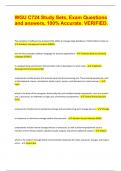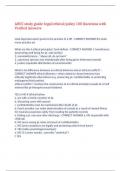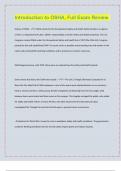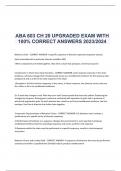UNIT 5 Task 1 full coursework
P1; explain the importance of promoting equality and diversity for individuals with different needs.
Equality
In the health and social care sector equality is making sure every individual is offered the same
opportunities such as access to healthcare treatments regardless of factors that may consider
someone to be different and opinionated. Examples of this are race, religion, mental or physical
health, and age. Additionally, this means being inclusive and considerate of individuals' beliefs and
specific requirements. This includes religious practices such as Jehovah's witness where they do not
believe in blood transfusion. The individual taking care of them must take into consideration medical
treatment that the patient does not want to participate in. Another example would be in Islam, it is
recommended for a patient to be seen by the same gender social care worker. The health and care
sector would accommodate this by providing them with a worker they would feel comfortable in.
However, sometimes workers cannot accommodate due to low staff or non-available at the
moment., Which could be seen as inequality. The importance of equality within the health sector is
to respect individuals’ privacy, dignity, and independence. This encourages health care professionals
to work in inclusive ways.
According to the health care plan service user R, he enjoys dressing up in clothes associated with the
opposite gender, he likes to spend his time at clubs for transverters. Additionally, his religious beliefs
are atheism meaning he does not believe in the existence of God. Individuals from LGBT backgrounds
experience a high amount of physical and mental inequality. R’s beliefs clash with traditional culture
and social norms. This can result in r experiencing inequality because he can be refused care by a
practitioner who may feel uncomfortable or do not agree with what he does. Furthermore, he may
also develop a fear of coming out in case of unwanted reactions from health care providers. This is
mostly caused by a lack of communication, culture, or social beliefs the provider believes in. R is 62
years old, and he can experience inequality because of this Aswell
diversity
Diversity in the health and social care sector is when there is a range of differences in society.
Furthermore, respecting individuals' beliefs and cultures. This is important to satisfy and meet
patient needs. Also, it will create healthy relationships between care providers and individuals, which
increases care productivity. An example of this is if a Muslim individual came in and they have special
dietary requirements, for it to be halal and they need an accommodation to practice their religion
,and pray. The health and social care sector would fulfil their needs by acquiring them with
accommodation that fulfils their personal needs. This helps individuals feel listened to and valued.
Discrimination
Discrimination is the unfair and prejudiced treatment of individuals based on characteristics like
religion. This is caused when someone has a prejudiced opinion and beliefs against someone or a
group of individuals. There are four types of discrimination: unfair, direct, indirect, positive
discrimination. Unfair discrimination is when individuals are treated differently and unfairly. Direct
discrimination is when healthcare providers treat you differently and worse than someone else. This
can be because of a variety of factors including age and disability. Indirect discrimination is when
healthcare sectors have a practice policy that applies to all users, but it impacts certain individuals in
a negative way because of who they are. Indirect discrimination can face challenges for individuals
because of their gender, race, religion, and disability.
R might experience positive, unfair and direct discrimination. R is a 62-year-old male, this means he
is prone to age discrimination. This results in when health care professionals make decisions about
the care and treatment of r, age can play a factor. Practitioners and providers might not take R’s
individuals needs but focus on his age. He suffers from speech difficulty and attends speech therapy.
This means he may take time to form sentences. People around him may not listen and wait patiently
for him to finish and immediately jump to conclusions and try and finish his sentences. This can make
R and people suffering with speech difficulty do not feel listened and feel undervalued. R has a
history of mental health conditions like loneliness and depression. He can be faced with
discrimination because of this. R’s practionar can negatively encounter attitudes about his mental
health, which can impact decision making and treatment. Health care providers can help and
manage this through therapy, about coming to terms with his conditions.
Jim might experience discrimination because of his age too, he is 92 years old, so he may experience
health care providers not taking his problem seriously and blaming it on his age. This can end up
worsening his condition. Within the health care sector, elderly individuals get provided with fewer
health resources. Secondly, Jim is a retired local government, however, he is from a good class as he
has lived in a bungalow for 30 years. This can result in him experiencing positive discrimination
because of his social class. Jim is slightly hard of hearing; however, he does not wear a hearing aid.
This can create barriers in conversations as he might not hear details and become confused. Health
care providers can speak in a louder tone if Jim instructs that he is struggling. On the other hand, Jim
may feel frustrated after not hearing or asking to repeat. This can impact treatment and relationships
formed.
Thornicroft, G., Rose, D. and Kassam, A. (2007). Discrimination in health care against people with
mental illness. International Review of Psychiatry, 19(2), pp.113–122.
, (Billingham, Davenport and Haworth, 2016)
Prevention of discrimination
It is important to prevent discrimination because discrimination can have detrimental side effects on
an individual, preventing this can help protect patient and staff rights and wellbeing. Especially one
who is already suffering with physical and mental conditions. The effects discrimination has on
service users and workers are loss of self-esteem, withdrawal from social activities and they start to
become reluctant to seek medical attention in fear of being discriminated against or judged.
Additionally, preventing discrimination makes services users and staff feel valued and welcomed. This
can help the productivity of the health care system. If a service user started to experience
discrimination in the workplace and started to miss appointment because of the events. This cost the
NHS £120. Furthermore, when practitioners feel their opinions are valued in society and especially in
the workplace, they are more likely to perform better at treating patients and developing
relationships. Initiative that should be placed to prevent patient discrimination are that staff should
avoid using discriminatory language and behavior. Prevention strategies ensure that everyone
receives health care services and other support equally. Another reason is that it helps
Discrimination prevention is specially needed for service user R because R is no longer able to work
due to this medical condition and he occasionally needs help eliminating. This can be quite
embarrassing from time to time, he has even expressed this.
asking lot (n.d.). Why Is Discrimination Important in Health and Social Care? [online] Available at:
https://askingthelot.com/why-is-discrimination-important-in-health-and-social-care/ [Accessed 4
Feb. 2022].
initiatives to prevent discrimination
The initiatives put in to prevent patients from feeling discriminated against and left. The first type is
access. This is when services and the environment become adapted to help accommodate individual
with special access. Examples of this are disabled parking near shopping, so when wheelchair users
or individuals with low mobility are encouraged to walk around but do not have to walk a long way
from their car to the shop. Another one is Braile on food, medications and signs. This makes blind
people not feel left out and build confidence in themselves. Access arrangements help to support
service users to get the help and support they require. However, this access equipment can cost a
lot, so this will put buildings off from installing it. Additionally, this builds confidence and
independence of service users, they start to have a positive mindset and do not feel demotivated
about having to rely on others.
P1; explain the importance of promoting equality and diversity for individuals with different needs.
Equality
In the health and social care sector equality is making sure every individual is offered the same
opportunities such as access to healthcare treatments regardless of factors that may consider
someone to be different and opinionated. Examples of this are race, religion, mental or physical
health, and age. Additionally, this means being inclusive and considerate of individuals' beliefs and
specific requirements. This includes religious practices such as Jehovah's witness where they do not
believe in blood transfusion. The individual taking care of them must take into consideration medical
treatment that the patient does not want to participate in. Another example would be in Islam, it is
recommended for a patient to be seen by the same gender social care worker. The health and care
sector would accommodate this by providing them with a worker they would feel comfortable in.
However, sometimes workers cannot accommodate due to low staff or non-available at the
moment., Which could be seen as inequality. The importance of equality within the health sector is
to respect individuals’ privacy, dignity, and independence. This encourages health care professionals
to work in inclusive ways.
According to the health care plan service user R, he enjoys dressing up in clothes associated with the
opposite gender, he likes to spend his time at clubs for transverters. Additionally, his religious beliefs
are atheism meaning he does not believe in the existence of God. Individuals from LGBT backgrounds
experience a high amount of physical and mental inequality. R’s beliefs clash with traditional culture
and social norms. This can result in r experiencing inequality because he can be refused care by a
practitioner who may feel uncomfortable or do not agree with what he does. Furthermore, he may
also develop a fear of coming out in case of unwanted reactions from health care providers. This is
mostly caused by a lack of communication, culture, or social beliefs the provider believes in. R is 62
years old, and he can experience inequality because of this Aswell
diversity
Diversity in the health and social care sector is when there is a range of differences in society.
Furthermore, respecting individuals' beliefs and cultures. This is important to satisfy and meet
patient needs. Also, it will create healthy relationships between care providers and individuals, which
increases care productivity. An example of this is if a Muslim individual came in and they have special
dietary requirements, for it to be halal and they need an accommodation to practice their religion
,and pray. The health and social care sector would fulfil their needs by acquiring them with
accommodation that fulfils their personal needs. This helps individuals feel listened to and valued.
Discrimination
Discrimination is the unfair and prejudiced treatment of individuals based on characteristics like
religion. This is caused when someone has a prejudiced opinion and beliefs against someone or a
group of individuals. There are four types of discrimination: unfair, direct, indirect, positive
discrimination. Unfair discrimination is when individuals are treated differently and unfairly. Direct
discrimination is when healthcare providers treat you differently and worse than someone else. This
can be because of a variety of factors including age and disability. Indirect discrimination is when
healthcare sectors have a practice policy that applies to all users, but it impacts certain individuals in
a negative way because of who they are. Indirect discrimination can face challenges for individuals
because of their gender, race, religion, and disability.
R might experience positive, unfair and direct discrimination. R is a 62-year-old male, this means he
is prone to age discrimination. This results in when health care professionals make decisions about
the care and treatment of r, age can play a factor. Practitioners and providers might not take R’s
individuals needs but focus on his age. He suffers from speech difficulty and attends speech therapy.
This means he may take time to form sentences. People around him may not listen and wait patiently
for him to finish and immediately jump to conclusions and try and finish his sentences. This can make
R and people suffering with speech difficulty do not feel listened and feel undervalued. R has a
history of mental health conditions like loneliness and depression. He can be faced with
discrimination because of this. R’s practionar can negatively encounter attitudes about his mental
health, which can impact decision making and treatment. Health care providers can help and
manage this through therapy, about coming to terms with his conditions.
Jim might experience discrimination because of his age too, he is 92 years old, so he may experience
health care providers not taking his problem seriously and blaming it on his age. This can end up
worsening his condition. Within the health care sector, elderly individuals get provided with fewer
health resources. Secondly, Jim is a retired local government, however, he is from a good class as he
has lived in a bungalow for 30 years. This can result in him experiencing positive discrimination
because of his social class. Jim is slightly hard of hearing; however, he does not wear a hearing aid.
This can create barriers in conversations as he might not hear details and become confused. Health
care providers can speak in a louder tone if Jim instructs that he is struggling. On the other hand, Jim
may feel frustrated after not hearing or asking to repeat. This can impact treatment and relationships
formed.
Thornicroft, G., Rose, D. and Kassam, A. (2007). Discrimination in health care against people with
mental illness. International Review of Psychiatry, 19(2), pp.113–122.
, (Billingham, Davenport and Haworth, 2016)
Prevention of discrimination
It is important to prevent discrimination because discrimination can have detrimental side effects on
an individual, preventing this can help protect patient and staff rights and wellbeing. Especially one
who is already suffering with physical and mental conditions. The effects discrimination has on
service users and workers are loss of self-esteem, withdrawal from social activities and they start to
become reluctant to seek medical attention in fear of being discriminated against or judged.
Additionally, preventing discrimination makes services users and staff feel valued and welcomed. This
can help the productivity of the health care system. If a service user started to experience
discrimination in the workplace and started to miss appointment because of the events. This cost the
NHS £120. Furthermore, when practitioners feel their opinions are valued in society and especially in
the workplace, they are more likely to perform better at treating patients and developing
relationships. Initiative that should be placed to prevent patient discrimination are that staff should
avoid using discriminatory language and behavior. Prevention strategies ensure that everyone
receives health care services and other support equally. Another reason is that it helps
Discrimination prevention is specially needed for service user R because R is no longer able to work
due to this medical condition and he occasionally needs help eliminating. This can be quite
embarrassing from time to time, he has even expressed this.
asking lot (n.d.). Why Is Discrimination Important in Health and Social Care? [online] Available at:
https://askingthelot.com/why-is-discrimination-important-in-health-and-social-care/ [Accessed 4
Feb. 2022].
initiatives to prevent discrimination
The initiatives put in to prevent patients from feeling discriminated against and left. The first type is
access. This is when services and the environment become adapted to help accommodate individual
with special access. Examples of this are disabled parking near shopping, so when wheelchair users
or individuals with low mobility are encouraged to walk around but do not have to walk a long way
from their car to the shop. Another one is Braile on food, medications and signs. This makes blind
people not feel left out and build confidence in themselves. Access arrangements help to support
service users to get the help and support they require. However, this access equipment can cost a
lot, so this will put buildings off from installing it. Additionally, this builds confidence and
independence of service users, they start to have a positive mindset and do not feel demotivated
about having to rely on others.










